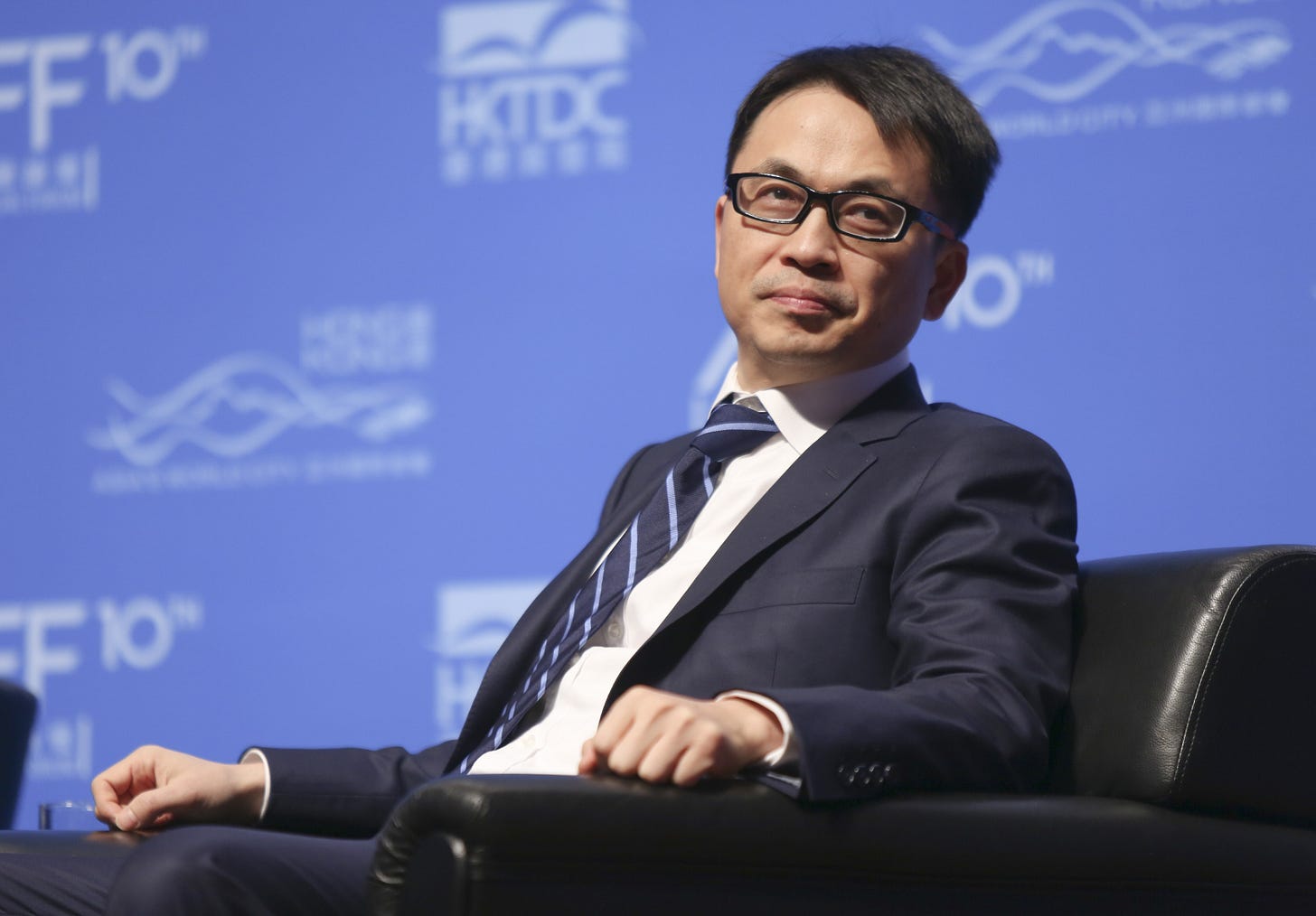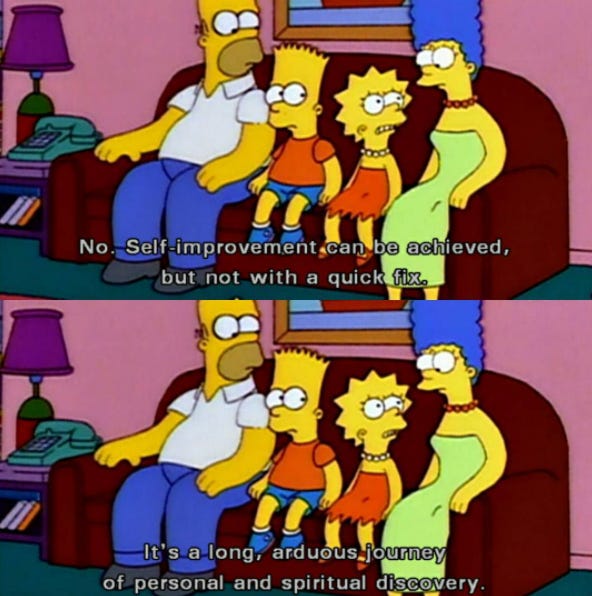Suffering from Success, Professional vs Retail, and Zhang Lei
You can steal from anything. You should!
Hey! Issue #15 reporting for duty. Like last week (and the week before that), I’ll be sharing I’ve been reading, learning, and compressing. But first, a quote from Daily Stoic: (h/t to Tejas Gutka and his awesome newsletter, The Weekend Bulletin)
Why do we read? Because it’s fun. Because it’s part of philosophy. It gives us one of the best forms of relaxation. It lets us communicate with the greatest minds to ever live. It lets us be friends with them too. It gives us answers to our problems. Reading makes us rich. In more ways than one.
Here’s the format of today’s email:
Part 1: Suffering from Success
Part 2: Retail vs Professional Investors
Part 3: Under the Spotlight: Zhang Lei
Part 4: Bonus Quirky Content - Something to Read, Watch, and Listen.
Suffering from Success
I’m not talking about DJ Khaled here. I’m talking about what happens if you make an investment, and it end ups going 100x. What do you do? What should you do? Do you do anything?
Because everyone loves talking about how if you bought $10,000 worth of Tesla at IPO in 2010, you’d have like $1m+ now. What they don’t talk about is assuming you still hold, it basically makes up your entire portfolio now.
Some quick and dirty math:
Assume the $10k TSLA IPO purchase was 10% of your portfolio. The other $90,000 in an S&P 500 index fund. Ignoring dividends (because this is quick and dirty math), your $90k in the index fund (and originally 90% of your portfolio), would now be worth ~$315,000. But that $315k now only makes up ~20% of your current $1.5 million portfolio.
The question I’m trying to answer is: What happens when you have an investment that does so well, it fucks up everything else?
It’s a good problem to have. But it’s still a problem.
Do you trim your position and rebalance? Do you cash out your initial investment and let the rest ride?

Had a few interesting answers like:
Re-balancing to equal weights semi-annually to remove this decision
Diversify into your other portfolio positions
Do nothing and accept the probability that a small number of positions will account for a large amount of your gains
Take out your initial investment and:
I’ll finish with this gem:


I don’t know what the correct answer is. I don’t know if there is a correct answer. You do you.
Professional vs Retail Investors
@midtown_rob asked a great question the other day “What are some things HF analysts/PMs know that retail investors don’t?”. And the responses are equally interesting.
Because as a retail investor, if you can acknowledge your weaknesses, blind spots, and deficiencies, you can then leverage and double down on your strengths.
Professional Investor Benefits?
Information flow
Being able to invest throughout the capital structure
From @FOofBearTheDog “a lot of the value add is not necessarily in the securities traded, it is knowing when to buy and when to sell. People lose money on hot stock tips not because they are necessarily a bad idea, but because of you don't really get the thesis then you don't know when it changes”
Sounds silly, but having it as a full-time job. It forces you to turn up every day and give your best. To learn something new and apply it. You’re putting in the reps and the hours because you’re paid to do it.
Access to more tools like CapIQ, Bloomberg Terminals, etc. (I would argue that this isn’t an exclusive benefit to professional investors compared to other mentioned points, but it can be a legitimate hurdle as the cost is ridiculous)
My opinion based on a brief role at a quant fund? Information flow is a huge benefit for professional investors. The best part of being at a fund was getting to hang around smart people with similar interests. Coffee chats and meetings gave me access to people who understood companies like the back of their hand and were happy to share. Whereas now, if I don’t make an effort to check the stockmarket or read the latest news, I legit have no clue what’s going on. But on the flip side, this means I can avoid the noise easily. There are definitely pros and cons to each. I’ll leave you with this:

Under the Spotlight: Zhang Lei
Each week I provide a little spotlight on an investor or operator I admire.
Zhang Lei is this weeks focus, in a nutshell:
Born in Zhumadian, a village in Henan province, central China. I can’t find what his parents did but apparently, he didn’t come from a wealthy background.
His first foray into business was when he was seven. He sold magazines, water, instant noodles and spicy Hunan sausages at a train station that connected Guangzhou and Beijing.
He scored the highest marks in his province on his college entrance exams, so he won a scholarship to Renmin University in Beijing, where he studied finance.
Founded Hillhouse Capital in 2005. Hillhouse today manages more than $50b USD.
Zhang makes a quality point about empathy and how competitors can help grow a market together. Now call me soft, delusional, or a bonehead with little life experience, but I think there’s plenty of extra value to be extracted when being collaborative rather than competitive 100% of the time.
There are many great qualities to look for: persistence, smarts, teamwork orientation. But I would emphasize empathy and the ability to connect with people who are different from you. We see that great entrepreneurs will always have unbelievable empathy for their customers, their employees and even their competitors. The best entrepreneur does not necessarily view competitors as if it were some game, but they think about how the competitors together will nurture the market.
Zhang Lei has Lunch with the FT [Link]
I feel like I harp on about how you should take lessons from an area and apply it to another, but Zhang echoes similar thoughts:
The entrepreneurs in my portfolio companies learn from each other. Etailers learn how offline companies think and retailers learn how eCommerce companies think.
Robert Shiller Interviews Zhang Lei [Link]
Investing in yourself and your education? Extremely underrated.
There's nothing better than investing in yourself and investing in your education. And education investment over the long-run always produce the best compounding results that you could never imagine. That's, for sure, the best investment you could ever make on yourself, on your friends and your relatives, and the society. I have a deep belief in that.
Also, I like Zhang’s thoughts on not only how technology might change, but how technology change might affect different people in different ways.
There two things that we should be mindful of: One is about technology change. Artificial intelligence would that replace human capital? Secondly, about the knowledge gap, or digital gap, between different socioeconomic classes of people especially in places like emerging market where they don't have the same access. The people in a suburb of Jakarta may not have the same access for the people in New Haven. So, how do you bridge that gap? The little gap actually kind of widened. So, how do you bridge that gap? And also, how do you think about technology, not as disfranchising factor and actually as the equalizer. As a equalizer to help bring people together. Those things are very interesting.
Bonus Quirky Content
Something to read: How to Be an Artist by Jerry Saltz [Link]
Like stuff I usually recommend, How to Be an Artist could be titled How to Be Anything. You gotta take the lessons and apply them elsewhere!
Lesson 17: See As Much As You Can
Critics see by standing back, getting close, stepping up and back; looking at a whole show, comparing one work to another; considering the artist’s past work, assessing developments, repetitions, regressions, failures, lack of originality; etc.
Artists see very differently: They get very close to a work; they inspect every detail, its textures, materials, makeup; they touch it, look at the edges and around the back of the object.
What are the artists doing? They will say, “Seeing how it is made.” I would say, “Stealing.”
You can steal from anything. You should! You better! Bad art teaches you as much as good art. Maybe more! Great art is often the enemy of the good; it doesn’t leave you enough room to steal.
and I legit re-read this a couple of times:
Lesson 21: Define Success
But be careful. Typical answers are money, happiness, freedom, “doing what I want,” having a community of artists, having people see what I do.
But … if you marry a rich person and have lots of money, would you be satisfied with just the money? Also, Subway sells a lot of sandwiches, but that doesn’t make them good.
What about being “happy”? Don’t be silly! A lot of successful people are unhappy. And a lot of happy people aren’t successful. I’m “successful,” and I’m confused, terrified, insecure, and foul all the time. Success and happiness live on different sides of the tracks.
Do you want the real definition of success? The best definition of success is time — the time to do your work.
How will you make time if you don’t have money? You will work full time for a long time. You will be depressed because of this for a long time — resentful, frustrated, envious. I’m sorry, that’s the way it is.
But you’re a sneaky, resourceful artist! Soon you figure out a way to work only four days a week; you start to be a little less depressed. But then on Sunday night, you’re depressed again, back on your ride-to-nowhere job that’s still taking up too much of your time.
But you are really sneaky and resourceful; this is a life-and-death matter to you. Eventually — and this comes for fully 80 percent of the artists I have ever known — you scam a way to work an only-three-days-a-week job. You may work in a gallery; for an artist or a museum; as a teacher, an art critic, an art handler, a bookkeeper, a proofreader, whatever.
Now you aren’t depressed anymore: You have time to make your work and hang out more; you are now the first measure of successful. Now get to work. Or quit being an artist.
Something to watch: Behind Costco's Treasure-Hunt Shopping Strategy | WSJ [6 mins]
Perth only got our first Costco last year. And boy am I intrigued and in love. This video does a decent job explaining why. It’s a new experience every time. Maybe Costco might be a boring, regular thing for you. But I have little experience with them so they seem interesting as hell.
Something to listen to: World War Z: An Oral History of the Zombie War by Max Brooks
Get the audiobook. It’s so good. Different voice actors for every character. Incredibly well produced. I’m a sucker for zombies and doomsday scenarios, but this was next level good.
Most people don't believe something can happen until it already has. That's not stupidity or weakness, that's just human nature.
Also, lmao at this bit of gold:
Do you understand economics? I mean big-time, prewar, global capitalism. Do you get how it worked? I don't, and anyone who says they do is full of shit.
Final thought for the week:
Until I grace your inbox’s presence next week, have a good one!
- Salami Carrot
You can find previous issues of Curated by Kalani here. I’m on the web at kscarrott.com and on Twitter @scarrottkalani.
Liked this post? Why not sign up.





